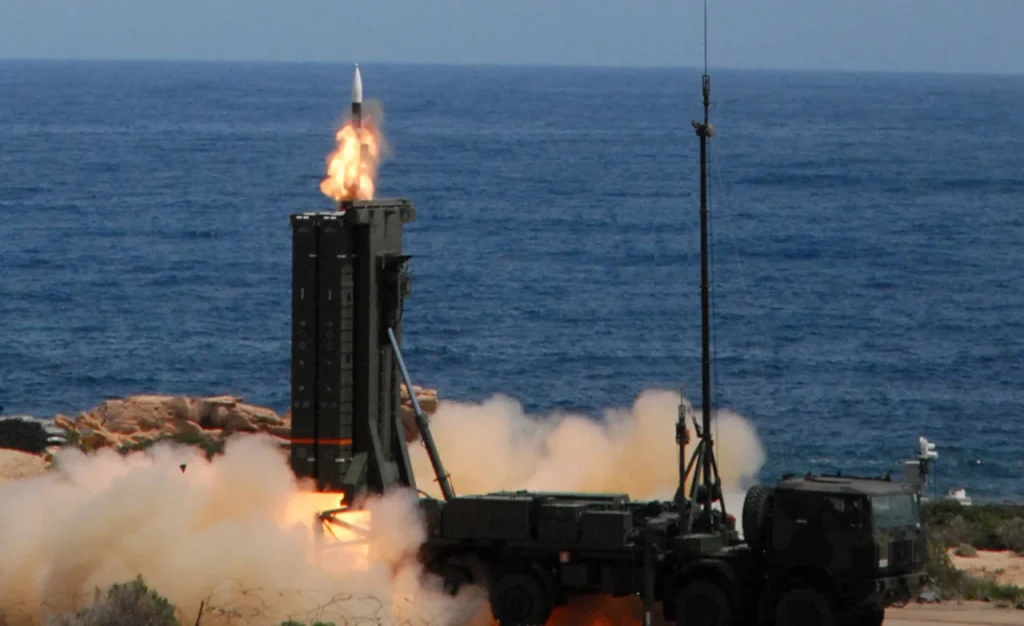In October, Germany was successful in persuading approximately fifteen countries that are already members of NATO [or are about to become one, like Finland] to join its “European Sky Shield” initiative. This initiative aims to create a European air defence system through the joint acquisition of the necessary capabilities. Germany was successful in achieving this goal.
And among the latter, particular attention is being paid to the IRIS-T SLM (produced by Diehl Defence), the Arrow-3 (created by Israel with support from the United States), and the Patriot system. And for the Franco-Italian Aster-30 SAMP/T [Sol Air Moyenne Range / Terrestre] system (also called the MAMBA air defence system), no case has been made yet. This is why neither France nor Italy participated in the initiative Germany took. In addition, this would have infuriated Paris, which would explain, according to the rumour, why relations between Paris and Berlin have become increasingly frosty. France has bet everything on its Mamba ground-to-air system.
On November 9, in conjunction with the publication of the National Strategic Review, which will serve as the foundation for the future Military Programming Law, President Macron briefly referred to this “European Sky Shield” initiative without really referring to it by name.
“Europe is no longer safe from missile and drone strikes. And we must integrate this reality because technology now makes available to adversaries, who are not always States, the means to strike from a distance”, Emmanuel Macron first noted.
“I know. I read more than some people in Europe think about it,” he said. This is almost certainly a reference to German Chancellor Olaf Scholz, who brought up this topic during a speech that was delivered in Prague in August of the previous year. In that speech, the announcement that was made to kick off the project that is currently being referred to as “European Sky Shield” was also made.
However, Mr. Macron continued, “the air defence of our continent is a strategic, united issue with multiple ramifications. [It] cannot be reduced to the promotion of a national industry or third-party industries at the expense of European sovereignty”. Again, it is difficult to avoid making the connection with the systems that are planned to be implemented for the project that is being carried out in Germany.

According to the tenant of the Élysée, this subject “therefore deserves an inclusive, in-depth approach, based on a strategic analysis and integrating the entire spectrum of our defence”. And to conclude, without delivering the slightest precision: “We will propose, and we will contribute”.
Having said that, after delivering this “sting” to Berlin, Mr. Macron then proceeded to spend the ointment discussing European collaboration, a topic heavily featured in the National Strategic Review. And he underlined his intention to “strengthen our ties with Germany,” which he referred to as an “indispensable partner with whom we are engaged in deeply structuring programmes,” specifically in reference to the SCAF [Future Air Fighting System] and the combat tank of the future. The two countries have a “shared industrial excellence” as well as an “operational reality and a strategic aim,” and “our forces are made to combine,” he said.
“I also believe that the success of the European project depends in part on the balance of our partnership, and in this respect, I hope that we can achieve decisive progress in the coming weeks,” said Mr. Macron.
On the other hand, he lauded the positive aspects of other forms of collaboration, namely those that had been formed with Belgium on the medium armoured segment of the Scorpion/CaMo programme. Alternatively, the reconciliation with Greece and Croatia.
In addition, Mr. Macron brought up the collaboration that would develop within the framework of the Quirinal Treaty that has been established with Italy. Then, in contrast to the other interventions that have been made, this one is a first: he had a term for the unique bond that ties France and the United Kingdom in matters pertaining to military action.
“Our partnership with the United Kingdom must also be taken to another level. And I would like us to actively resume the thread of our dialogue on operations, capabilities, nuclear and the hybrid domain. And reconnect with the ambition that befits our two countries, friends and allies,” President Macron said.
Resolving the latest disputes
The relationship between Olaf Scholz, the silent and Emmanuel Macron, the talkative, is not warm. Both parties need to remember the strategies that are normally used to resolve disagreements that arise between partners. Jacques Chirac and Gerhard Schroder were able to find convergence with the “Blaesheim process” in 2001 during the crisis at the euro’s birth and around the Treaty of Nice. This process is a method that is based on the regular organisation of small informal groups. A strategy for going beyond national interests and bringing about an atmosphere of relaxation is greatly needed right now.
